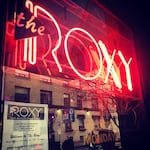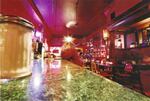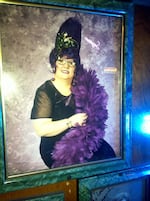
The Roxy, Portland's 24-hour, LGBTQ-friendly diner closed its doors for good on March 20, 2022. Photo from Instagram provided to OPB by @ankincannon.
Ashley Kincannon
If you ever found your way into Suzanne Hale’s restaurant, I hope you knew how to behave — for your own sake.
“If a customer came in and said, ‘I just want a fucking cup of coffee,’” Hale said, “I would just smile and say, ‘Well, a fucking cup of coffee is extra.’”
Hale can be gruff, but there’s a reason why her legions of adoring fans call her “The Lovely Suzanne.” Hale’s restaurant, The Roxy, was an anchor for downtown Portland’s nightlife aficionados for 27 years. Open 24 hours a day, except Mondays, the diner attracted partygoers, cab drivers, and graveyard shift workers in droves. It was also an anchor for the city’s LGBTQ community. For queer or homeless teenagers, it was one of the few places they could always find refuge, no matter what time of day.
“The Lovely Suzanne” and her daughter (and Roxy General Manager) April Shattuck created something that sounds like an anomaly: an often raunchy all-night diner that was also a place of safety and security for hundreds, if not thousands, of people.
“A 24-hour restaurant can be a sketchy place, a rough place to be,” Hale said. “But it wasn’t. It’s part of why people felt safe there, because we didn’t tolerate any of that.”
After struggling through the pandemic and a building fire, The Roxy closed for good on March 20. It left a giant, pancake-and-chicken-fried-steak-sized hole in the hearts of a generation of people who grew up and found community there.
‘You don’t go to Denny’s in drag’
“The thing that was really special about The Roxy is that it was an all-ages space and a 24-hour space,” said Brooke Jackson-Glidden, Editor of Eater Portland. “I think that a lot of young queer people don’t really have a ton of queer spaces available to them. Especially [in the ‘90s], there just really wasn’t that many places where you could really interact with queer adults. It created this space where people could really explore their queerness.”
Maria Peters Lake was one of those queer adults when The Roxy opened in 1994. At the time, she was the reigning Empress of the Imperial Sovereign Rose Court, Oregon’s longest-running LGBTQ charity organization. Today, Peters Lake runs the nonprofit Peacock Productions. She said the restaurant was an important complement to the LGBTQ-friendly queer bars and businesses that made up the Burnside Triangle.
“It gave us a space to be who we were, so we felt comfortable,” Peters Lake said. “We lived there, back in that day. That was really our street because after the party, after the bar, it was 24 hours and that’s where you would end up going. A lot of the drag queens get out of drag and go to a regular restaurant or straight restaurant or whatever. You don’t go to Denny’s in drag in the ‘90s.”
The late-night crowd

A late night at The Roxy in downtown Portland in 2011.
Suzanne Hale
Shattuck said crowds would come in waves: a surge of drunk revelers after the bars closed at 2:30 a.m., then a second rush at 4 a.m. when the staff from those same bars showed up.
“Great regulars, all those people, especially from the gay bars in the city,” Shattuck said. “Everything from telling dirty jokes to sharing things that are going on in each of our families. Just, you know, the bonding. You may not even know their name, but you know their usual order. You know, ‘Oh, did your grandma get out of the hospital yet?’ There was a real sense of bonding and I’m so grateful and humbled to have been included in all of that over the years.”
Night after night, it was a welcoming family, a true model of radical inclusivity: straight and queer, housed and homeless, young and old.
“There’s only one customer that I gave the stink eye to, and would watch like a hawk,” Shattuck said. “That would be rich white frat boys. They were the ones who would tend to ‘dine and dash,’ or cause trouble.”
A refuge for thousands

Owner Suzanne Hale, known affectionately as "The Lovely Suzanne," on the The Roxy's Hall of Fame in Portland.
Suzanne Hale
“You know, she will not sing her own praises,” former regular Maria Peters Lake said of Hale. “There’s so many things that she did for this community, especially for the youth to make them feel safe and loved and wanted and important.”
“We all know the stories of youth that were kicked out by their families living on the streets. You know, sleeping on the couch, trying to just make it. They could go in the Roxy and get a meal, stay warm, feel loved.”
When I asked Hale if she has stories of customers that stick with her, she doesn’t even pause.
“Thousands,” she said. “Thousands.”
One of them included a14-year-old prostitute who would come in late at night.
“This kid was selling his body on the street,” Hale said. “He had been thrown out of his home for being gay. The simple fact that I knew their name and said hi to them, they were so pleased and puffed up, and almost like, ‘The owner knows my name!’ So I always made it made a point to do that.”
“I mean, it was a little thing for me, but it seemed like a big thing to him and I watched this kid grow up. I watched him become healthier, have a long-term lover. He’s now married, he’s gone to school, got a degree, has got management job.”
That kid, now an adult, was sitting in a booth at The Roxy on the last day it was open — paying his respects to the family behind the restaurant that changed his life.
Life after The Roxy
Hale is still ambivalent about her decision to close The Roxy. Although the last day of service was March 20, she’s still hard at work, trying to secure a new job for every person who worked for her.
And there are certain perks to no longer owning a restaurant that’s open 24 hours a day.
“Today was the first day in 30 years that I was able to sleep until 11 a.m.,” Hale said. “To just turn my phone off. When you own a 24-hour restaurant, you never turn the phone off.”
Listen to Brooke Jackson-Glidden and Maria Peters Lake’s conversation with OPB Weekend Edition host John Notarianni using the audio player above.
